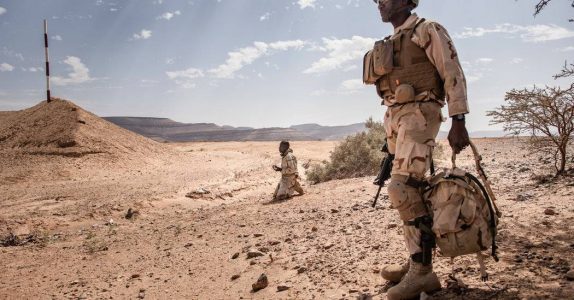
Al-Qaeda and Islamic State terrorists are cooperating in Africa
The only place in the world where fighters linked to al-Qaida and the Islamic State group are cooperating is in West Africa’s sprawling Sahel region, giving the extremists greater depth as they push into new areas, according to the commander of the U.S. military’s special forces in Africa.
“I believe that if it’s left unchecked it could very easily develop into a great threat to the West and the United States,” U.S. Air Force Brig. Gen. Dagvin Anderson told The Associated Press in an interview this week.
The leader of U.S. Special Operations Command Africa described the threat even as the Pentagon considers reducing the U.S. military presence in Africa.
Experts have long worried about collaboration between al-Qaida and the Islamic State group. While the cooperation in the Sahel is not currently a direct threat to the U.S. or the West, “it’s very destabilizing to the region,” Anderson said.
He spoke on the sidelines of the U.S. military’s annual counterterrorism exercise in West Africa, currently the most active region for extremists on the continent.
The alarming new collaboration in the Sahel between affiliates of al-Qaida and ISIS is a result of ethnic ties in the region that includes Mali, Niger and Burkina Faso.
“Whereas in other parts of the world they have different objectives and a different point of view that tends to bring Islamic State and al-Qaida into conflict, here they’re able to overcome that and work for a common purpose,” Anderson said, emphasizing that it’s a local phenomenon.
The cooperation allows the extremist groups to appeal to a wider audience in a largely rural region where government presence is sparse and frustration with unemployment is high.
The past year has seen a surge in deadly violence in the Sahel, with more than 2,600 people killed and more than half a million displaced in Burkina Faso alone.
Al-Qaida is the deeper threat both in the region and globally, Anderson said.
The most prominent of those affiliates is a coalition of al-Qaida-linked groups known as JNIM with about 2,000 fighters in the region, according to the Center for Strategic and International Studies.
West Africa’s Sahel, the vast strip of land just south of the Sahara Desert, for years has struggled to contain the extremist threat.
In 2012, al-Qaida-linked fighters seized large areas of northern Mali. French forces pushed them from strongholds in 2013 but the fighters have regrouped and spread south.
The largest ISIS affiliate in the region, Islamic State in the Greater Sahara, emerged more recently and claimed responsibility for killing four U.S. soldiers in Niger in 2017. The attack led to an outcry in Washington and questions about the U.S. military presence in Africa.
The strategy for countering the growing threat from the patchwork of Islamic extremist groups is a whole-of-governance one that goes beyond military efforts, Anderson said.
Source: NWA Online





